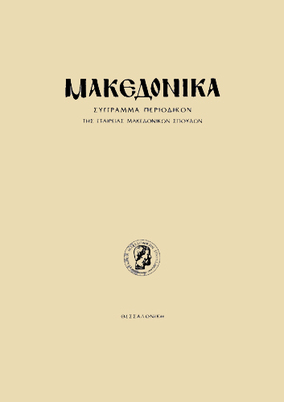Ο μητροπολίτης Μελενίκου Προκόπιος ο Σερραίος : (περίπτωση ορθόδοξου αρχιερέα στη δίνη των εθνοφυλετικών ανταγωνισμών και της διαμάχης Αθηνών-Φαναρίου)
Part of : Μακεδονικά ; Vol.31, 1998, pages 259-280
Issue:
Pages:
259-280
Parallel Title:
Prokopios the Serrean, Metropolitan of Melnik : An Orthodox Prelate Caught up in the Maelstrom of Ethnic and Racial Rivalries and the Conflict between Athens and the Phanar
Section Title:
Articles
Author:
Abstract:
When the Bulgarian Question came to a head, some alarming tendencies appeared among metropolitans who seemed to be compliant towards the Bul garians and were hampering the work of the official national policy. The metropolitans were demanding greater authority —chiefly in the sphere of education— that was already being transferred to the consuls, thus rendering the collaboration between the Greek state and the Great Church increasingly delicate. A number of metropolitans were caught up in the maelstrom of ethnic and racial rivalries and the conflict between the two national centres, Athens and the Phanar. Some of them in particular, despite the strong feeling they provoked, showed themselves to be compliant and conciliatory towards the Slavonic element. One typical case of a metropolitan accused of being pro-Bulgarian was that of Prokopios of Melnik, who hailed from the village of Melenikitsi in Serres prefecture. His was a chequered career. As Bishop of Trikke (1849- 1854), he took part in the 1854 rebellion in Thessaly against the Turks, who exiled him to Mount Athos. Subsequently, as the delegate of Metropolitan Dionysios Tapinou in Melnik (1857-1863), he implemented a moderate policy, though he frequently favoured the local Bulgarians, and was indicted for this by the Greek diplomatic authorities. After nine years in the Diocese of Ersek in Hercegovina (1864-1875), which he organised in an exaemplary manner, he was elected Metropolitan of Melnik (1875-1891). His interest focused on the training of the clergy, so that he would have capable, educated men to work with. However, he was also concerned with the establishment and smooth running of Bulgarian schools, insofar as the Patriarchate would allow it, and he often provided openings for Panslavist propaganda. Prokopios’s conduct in Greek Melnik, particularly his sympathy for, and the genuine love he showed for the Bulgarian element, roused the suspicions of the Greek Consulate in Serres, which accused him of not being interested in working with it on national and educational affairs. The Greek diplomats asked the Patriarchate to remove Prokopios from his diocese on several occasions. The desire of the Demir Hissar section to have a bishop of its own was a blow struck against Prokopios, and the Tapinou family was also antipathetic towards him. On the other hand, Prokopios enjoyed the sympathy and support of the Patriarchate and, above all, its respect, given that he was one of its oldest and most loyal prelates. Apart from his conduct in Melnik, as a member of the synod he also took a general interest in Greek learning, being also a member of the Educational Fraternity, to which he gave both moral and financial support on a number of occasions. However, the backlash against him in his diocese was constantly on the increase, particularly after Athens imposed its line regarding national policy among the Greeks beyond the borders, and it continued until his death at a very advanced age in 1891.
Subject (LC):
Notes:
856:https://ejournals.epublishing.ekt.gr/index.php/makedonika/article/view/5687, DOI: https://doi.org/10.12681/makedonika.126
Electronic Resources:




